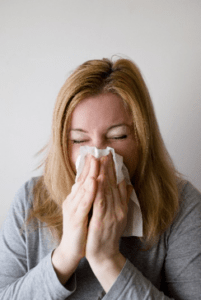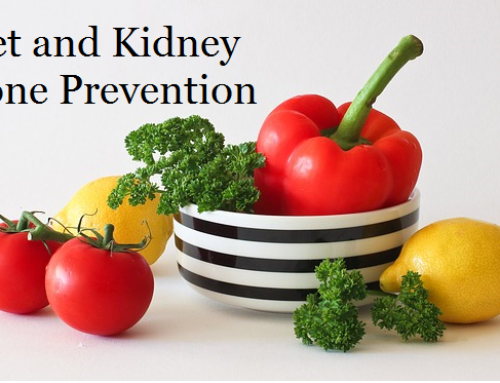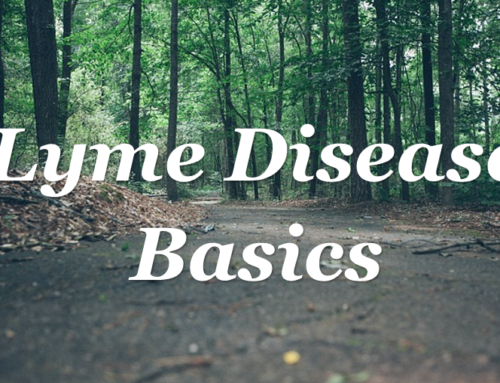ALLERGIES OR COLD?
Spring and early summer have brought a round of sniffles and unrelenting cough. High pollen counts and dry weather can make it difficult to distinguish if your symptoms are due to allergies or a cold. While many cold and allergy symptoms overlap, there are some defining characteristics that can help you tell the difference and determine the best treatment method.
One common overlapping symptom is chest congestion with a phlegmy cough. Allergies can also cause chest congestion and a bad cough due to mucus from the nasal sinuses dripping down the back of the throat (post-nasal drip). If you find yourself clearing your throat, followed by chest congestion, coughing, and thick mucus during dry, seasonal allergy weather with no fever or muscle aches, it is most likely an allergy. However, if these same symptoms present with a fever and/or muscle aches, lethargy or fatigue, you likely have a cold or flu.
DISTINGUISHING FEATURES:
When present, features distinguishing an infection from an allergy are a fever greater than 100°F measured orally and/or body aches. Symptoms common to both colds and allergies are: sore throat, stuffy nose, sneezing, and post-nasal drip. Viruses, the cause of colds, cannot be killed by antibiotics, like a “Z-pack.” Colds come on quickly and can include a mild fever, but usually resolve completely in one to two weeks once your body has fought off the virus. A fever of greater than 100 degrees Fahrenheit or severe body aches indicate you may have the flu, not a cold, and should contact your primary care provider.
TREATMENT REGIMEN FOR BOTH ALLERGIES AND A COLD:
When an allergen or infectious particle attaches to your mucus membranes, your body’s inflammatory response creates an immunologic response. Additional mucus is made to catch and flush away the virus, but this can cause serious congestion. Decongestants like Mucinex-D can be taken during the day to loosen this build-up of thick mucus. Thin, runny, watery discharge requires an anti-histamine (eg: Zyrtec, Allegra) instead of Mucinex-D. If your cough persists while sleeping, Mucinex DM can be used as a cough suppressant at bedtime.
A natural and very effective treatment option is to use a nasal saline rinse (like NeilMed sinus, Simply Saline, or CVS brand) which can aid your body in flushing the virus or allergens (pollen, dust, etc.) out of your sinus and nasal passages. This treatment should be followed within 30 minutes by a nasal spray (like Flonase), which will shrink nasal passages. Clearing and shrinking nasal passages rids the sinuses of the offending agent. With cleared sinuses, watery eyes drain easily through cleared passages and post-nasal drip will decrease since the nasal rinse has cleared most of the debris from the sinuses. Without post-nasal drip, chest congestion is markedly reduced.
This regimen should be administered 2-3 times daily as dictated by symptoms.
COLD-SPECIFIC REGIMEN:
An important thing to keep in mind is that your body can best fight infection when it is well rested and well hydrated. Allowing time for extra sleep during a cold, as well as drinking eight ounces of water or herbal caffeine-free tea every few hours and eating well, prepares your body with the energy and resources needed to combat a virus. In the winter, humidity levels in New England plummet, drying out nasal passages and creating the optimal environment for virus proliferation. Therefore, using a humidifier with warm mist in the bedroom at night will relieve the irritation and soreness of the throat and nose with moisture. Ideally, it is preferable to have a humidifier in your workspace as well.
Increasing your intake of Vitamin C to approximately 1000 milligrams (mg) per day for the duration of your cold can decrease the length of your sickness. These methods can help alleviate your cold symptoms and help you feel more functional as your body fights the virus.
If your symptoms have not gotten significantly better after two weeks, you may have developed a bacterial infection that needs a doctor’s attention or your symptoms may be more allergic in nature (even in the winter…think dust!).
ALLERGY-SPECIFIC REGIMEN:
Allergic symptoms are the result of your body interacting with inhaled allergens – environmental triggers that cause an immune system reaction. Immune cells in your body release chemicals called histamines that cause sinus swelling, which causes eye itchiness, mucus accumulation, post-nasal drip, and cough. The added mucus and airway irritation can also cause symptoms similar to asthma, such as tightness in the chest or difficulty breathing. While these symptoms can also be present in colds, most allergic symptoms occur seasonally and are long-lasting – it seems like a cold that won’t go away.
Antihistamine medications like Zyrtec, Claritin, and Allegra can help alleviate some of these allergic symptoms. Many people experience relief using these over-the-counter medications along with the nasal rinse followed by nasal spray mentioned above. Often even the non-drowsy formulations cause substantial drowsiness the following day. Therefore, it is recommended that they be taken in the early evening, and then as needed during the day. If you have tried these methods and are still suffering from allergic symptoms, talk to your primary care provider about prescription medication options, like Singulair.
When combating allergies, it is also important to prevent exposure as much as possible. For seasonal allergies, this can be done by keeping the windows closed, running a powerful air-cleaning HEPA filter in your home, and avoiding spending time outdoors when pollen counts are high. To further decrease allergens inside, take a shower in the evening or at night to wash off allergens stuck to your skin and hair that can be transferred to your bed. Also, change your clothes as soon as you come inside to avoid spreading allergens in your home. Using medications and avoiding allergens during allergy season can really make a difference!
With so many overlapping symptoms, it is easy to see how a cold and allergies could be confused. The attached graphic is intended to succinctly summarize this article. If you have any questions about your symptoms or treatment, please feel free to get in touch with our office, Enhanced Medical Care.








I’ve had post nasal drip, clearing throat and yellow phlegm my cough for the last 6 months since last September. Been to my doctor and an allergist that says I am allergic to everything except cockroaches and mold. I told my doctor I might have a sinus infection and he gave me 2 packs of azythromycin. This my third day to take the antibiotics and have notice no difference except stomach issues and very loose stools. Can’t take this anymore and don’t know what to do!
Have you tried NeilMed? It is a SPECIAL salt mixture that you use to clean out your nasal passages. We are not your doctor, so I cannot “recommend” this for you due to the fact that you may have other conditions which might make this
not a good idea for you. However, when our patients present with this, if the doctor deems it appropriate, we recommend NeilMed followed by Flonase. If you decide to use the NeilMed, follow the manufacturers directions carefully to avoid further infection. We recommend this twice daily to our patients. If it is allergies, try showering before bed, get a hepa filter for your bedroom and anywhere else you spend a considerable amount of time.
Change pillowcase and bed linens frequently in high pollen season.
Best of Luck!!!
Marilyn
Hello,
I think i have post nasal drip, but i don’t cough that much. I only cough when it’s itchy. WHAT IS GOING ON??
You need to follow up with a physician. It sounds as if you have an allergy, however to determine this conclusively, you need to see a doctor, have a history taken, and an exam.
I have cough for the last six month and sneezing after coughing my chest congest have been taking Lmontus what should I do
Please follow up with your primary care doctor. Are you certain of the spelling of your medication? Lmontus?
I have allergy of cold things ..when i go into a air conditional room i get headache within 1 min of expposure and get pain in nose and my nosw gets blocked what should i do
I would make sure your filtration on your air conditioner is cleaned regularly. If left uncleaned it can build mold.
This MAY be a mold reaction, but your need to see your physician to rule out other more serious causes.
I’ve had a cough for 3 months and was give antibiotics with no change. I’m using the nasal drops given and it allows me to breathe clearly however the cough and chest cold isn’t going away. What should I do?
I do not prescribe medicine for people that are not my patients. However there are multiple things that can be used. I strongly suggest that you see an allergist. In our practice we would prescribe Neilmed nasal rinse for patients where it is indicated. And that would be followed by a Flonase. Since we do not know you, I cannot prescribe this for you. I recommend seeing an allergist.
Best,
Marilyn
Hi Dr,
I have SLE Lupus, RA, MS.
I’ve suall year round allergies.
This year been unbearably.
My symtoms Sneezing, – hacking couch, alot, up, down, so aggregating!
I’ve been on Montulacast bed.
I did tell my Dr Wen I increased bedtime, mid morning. Seem be needing somewhat better.
As you know leaving Lupus- dry eyes, sling, this phlemy, irritating cough, sneezing, itchy.
I’d just like your take all I’ve explained bout my symts?
Thank you,
Lorena
I would have an allergist perform a full panel of skin prick allergy testing to determine what you are allergic to. After that, you can begin desentization immunotherapy for those allergens you are most reactive to. Some physicians will provide this immunotherapy by placing drops under the tongue. This should calm your allergic reactivities down.
I feel a lump in my throat, frequent throat clearing and breathing issues… Doctor provided me an inhaler… But nothing changed… All my blood test reports are normal… This is happening from the past 2 months…. Just want to get rid of this torture… Can you please help me…
It’s important to retur-n to your doctor, letting him or her know that the treatment prescribed did not work. This is helpful and valuable information for the physician. Of course I cannot treat or diagnose without an in person visit.
For almost two months, I sneezed every morning and had runny nose. In the evening I got cough with white phlegm. I don’t have fever, I lost weight, if I deep breath my chest ache. Last 2 weeks I went to Dr and they gave me montelukast 7 days and azithromycin 5 days. My cough stop and runny nose. 3 days after taking all meds my symptoms back. I don’t know what to do now
Keep taking the Montelukast daily. Take it year round. Try to find out what allergen(s) is doing you off. Pollen.com is a favorite of mine because it tells you what environmental allergens are at their peak in YOUR geographic location. You can also get environmental allergy testing from your doctor.
In addition, to minimize allergens in your home, damp clean surfaces several times a week when allergies are bothering you. Shower just before bed, change bed linens weekly.
I hope this helps.
Best,
Marilyn
I do not prescribe medicine for people that are not my patients. However there are multiple things that can be done a used. I strongly suggest that you see an allergist. In our practice we would prescribe Neilmed nasal rinse for patients where it is indicated. And that would be followed by a Flonase. Since we do not know you, I cannot prescribe this for you. I recommend seeing an allergist.
Best,
Marilyn
A little over a week ago i think, i got flu like symptoms: runny nose, sniffing, sneezing and fever too-or maybe it was because i was wearing layers . It lasted for about 2-3 days, i dont remember the exact amount. Someone in our house was sick first and then everyone got it in a different form, only later that week though. Im not sure what i have or maybe im overreacting but i sneeze a bit in a day, sniffing a little and clearing my throat, i’ve been really thirsty and not so hungry but i do try to eat and im not sure if i have a fever or if i just feel warm. when i came down with this, i could feel it in my chest and in my throat but at the back. my throat isnt sore or hoarse but it feels better when i drink water.
Thanks
Fifi
I do not prescribe medicine for people that are not my patients. However there are multiple things that can be used. I strongly suggest that you see an allergist. In our practice we would prescribe Neilmed nasal rinse for patients where it is indicated. And that would be followed by a Flonase. Since we do not know you, I cannot prescribe this for you. I recommend seeing an allergist.
Best,
Marilyn
sometimes when the weather changes i experience a few symptoms i believe to be allergies. it feels like there is something in my throat; no cough, no soreness. my ears also become sensitive – when i bend down or move around a certain way, my ears feel a little clogged but the sensation doesn’t last. could this be allergies due to weather changes/rainy/humid weather?
I do not prescribe medicine for people that are not my patients. However there are multiple things that can be used. I strongly suggest that you see an allergist. In our practice we would prescribe Neilmed nasal rinse for patients where it is indicated. And that would be followed by a Flonase. Since we do not know you, I cannot prescribe this for you. I recommend seeing an allergist.
Best,
Marilyn